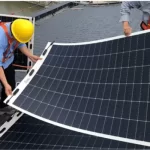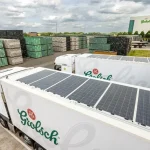Table of Contents
- What is a ground mounted solar panel system?
- What are the different types of ground mount solar installations?
- What are the advantages and disadvantages of ground mounted solar panels?
- Ground mounted solar panels vs roof: which is right for you?
- How much do ground-mounted solar panels cost?
- How many ground-mounted solar panels do I need?
- How are the solar panels installed on the ground?
- What are the best solar panel manufacturers?
- Final Thoughts
- Frequently Asked Questions
Ground mounted solar panels provide an additional option for people to power their homes with solar energy.Ground mount solar panel kits are pole mounted or standard mounted.
If a home does not have the ideal conditions for installing rooftop solar panels, solar panels mounted on the ground can provide homeowners with a way to increase home solar.
Find out why people choose ground mounted solar panels and if they are right for you.
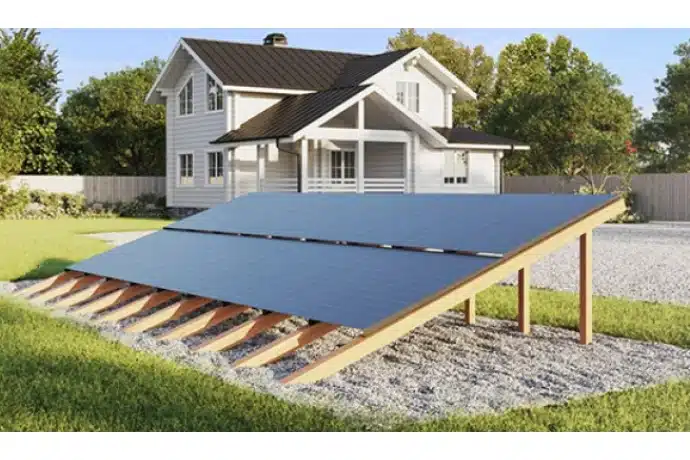
What is a ground mounted solar panel system?
A ground mounted solar power system is, as the name suggests, a solar panel system that is mounted on the ground rather than on the roof of your home.
Depending on the mounting system you choose, solar panel ground mounting systems will be placed a few inches to a few feet above the ground.
Module-level power electronics needed for quick shutdown will be attached to the panels, but other system components can be located some distance away so you can keep temperature-sensitive equipment such as string inverters and solar cells in your garage.
With solar panel ground mount, you have the flexibility to use any size solar panel, whereas rooftop solar systems are usually limited to smaller, lighter solar panels.
Solar panels mounted on the ground can be installed anywhere there is enough sunlight and open space – usually a minimum of 350 square feet is required.
Ground mount solar panels are also known as backyard solar panels, freestanding solar panels, and ground mount PV systems.
What are the different types of ground mount solar installations?
The two most common types of ground mount solar systems are standard ground mount solar panels and pole mount solar panels.
Standard Ground Mount Solar Panels
Standard ground mounting uses a metal frame driven into the ground to support the solar panels at a fixed angle. Throughout the year, homeowners can manually adjust the angle of the solar panels to capture more sunlight based on seasonal changes in the sun.
Pole Solar Panels
Pole solar systems, also known as pole solar arrays, involve mounting solar panels on one or more poles rather than placing them directly on the ground or roof.
Pole solar systems are often used in conjunction with a solar tracking system that automatically tilts the solar panels to capture the optimal amount of sunlight.
Pole mounts can be installed in areas with limited or uneven ground space, making them suitable for a variety of landscapes. This method also makes it easier to clean the solar panels.
For those seeking maximum solar efficiency, a pole mount system may be worth considering, as it can increase the output of solar panels by 25% or more.
These advanced systems use motors and sensors to automatically adjust the position of the solar panels throughout the day, following the path of the sun.
Pole mounted systems can also be specifically designed for high wind and severe weather applications.
If the system is good enough, pole-mounted solar panels can withstand almost any impact that ground-mounted solar panels endure.
What are the advantages and disadvantages of ground mounted solar panels?
|
Pros |
Cons |
| Solves existing or potential roof issues (limited space, weak structure, etc.) | More expensive than rooftop systems |
| Higher energy yield due to optimal placement (direction and angle) | Takes up valuable real estate |
| Easier to clean and maintain | Affects overall home aesthetics |
| Flexibility in installation direction and angle | More complicated installation process |
| Better control over solar panel direction and angle | Requires more time and effort to install |
| Less constrained by roof design | May need additional support structures |
| Improved airflow, enhancing performance, especially in hot weather | Limited by zoning and setback rules |
| Easier maintenance, replacement, and snow removal | More susceptible to ground-level damage factors |
| Eliminates risk of roof damage | Occupies valuable backyard space |
| No roof obstructions |
Advantages of Ground Mounted Solar Panels
Optimal Sun Exposure
The biggest advantage of ground mount solar panel kits is better control over the orientation and angle. solar panel mounts for ground need to be oriented towards the south or southwest to maximize sunlight reception.
On flat ground, you can place the solar panels in the best position, unlike on a sloping roof.
This advantage means that panels for ground can usually receive more sunlight, which produces more solar energy and saves you more money.
There may be obstacles on the roof, such as skylights or chimneys, making it difficult to install solar panels. The ground usually has more room to install more solar panels than the roof.
Aesthetic and Cost Considerations
Solar panel ground mounts also require more time and effort and are usually more expensive than rooftop solar panels.
However, this extra cost can be offset over time if your ground mounted system produces more energy.
The advantage of ground mounted solar panels is that they do not have to be installed on the roof. If your house is located in the shade but has a sunny backyard, the solar panels can be installed there.
Installation and Maintenance
Roof panels are limited by the design of the roof, which may not be ideal because residential ground mounted solar panels work best on a specific slope and direction. The optimal slope depends on your latitude, but the best orientation is essentially toward the equator.
Most roofs are not designed with solar panels in mind, so their location may not be the perfect spot to maximize solar energy production. Ground-mounted systems can be in the ideal position.
A solar panel ground mount kit also allows for better airflow than panels mounted on the roof, which can also improve performance, especially in hot weather.
The main advantage of solar panels mounted on the ground is the ease of maintenance, replacement and snow removal.
Roof mounting requires more labor costs and increases the complexity of future roof replacements. On the rare occasion that a house fire requires ventilation, firefighters usually need to cut a hole in the roof, another reason not to install expensive glass and aluminum on the roof.
Another benefit of leaving the roof out of the equation is that it eliminates the risk of damaging the roof. While solar installers offer warranties for roof leaks, the warranty usually does not extend the life of the solar panels. Removing the panels from the roof eliminates this problem altogether.
If your solar panels do require maintenance, it’s easier to access them on the ground than it is to climb onto the roof.
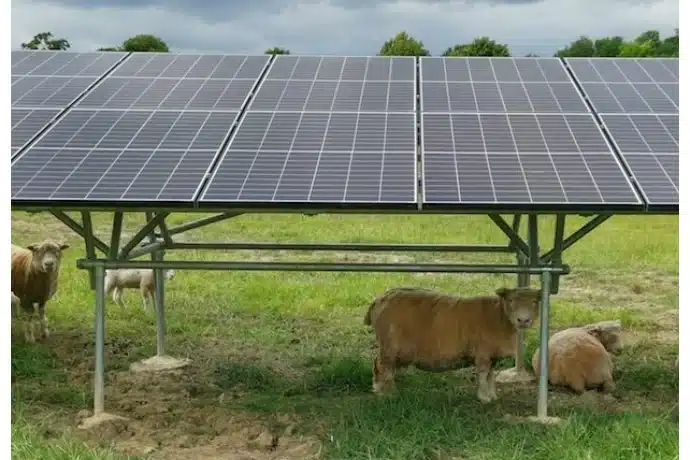
Disadvantages of Ground Mounted Solar Panels
Cost
The biggest disadvantage of solar panel ground mounting systems is the cost. Instead of being able to use an already built structure (the roof), installers need to build a new structure.
This usually requires more materials, upfront costs, and the digging of an underground line to connect the ground mounted array to the controller and the rest of the system.
Vulnerable to Damage
Solar panels mounted on the ground may also be more susceptible to damage. Lawnmowers don’t throw rocks on your roof, but ground-mounted solar panels can be at risk, depending on how close they are to the ground.
Being close to the ground puts your solar panels closer to animals, children, or other potentially damaging elements. There is no definitive data on the maintenance costs of ground mounted solar panels.
Taking up space
In many areas, zoning and setback rules can make it difficult to install a ground mounted system, as many properties may not have enough equity space to build an array.
While rooftop panels don’t take up any commonly used space, ground mounted solar panels for home may take up valuable backyard space.
Ground mounted solar panels vs roof: which is right for you?
The first step in determining whether roof-mounted or ground-mounted is best for your situation is to evaluate all of your real estate and determine the best potential locations for solar panels based on energy production potential. Are the south-facing portions of your roof and yard shaded?
If both the roof and ground have good solar potential, go on to consider some other issues such as potential access needs and the cost of ground versus roof mounting.
Finally, you may just need to consider whether the array can add to the landscape.
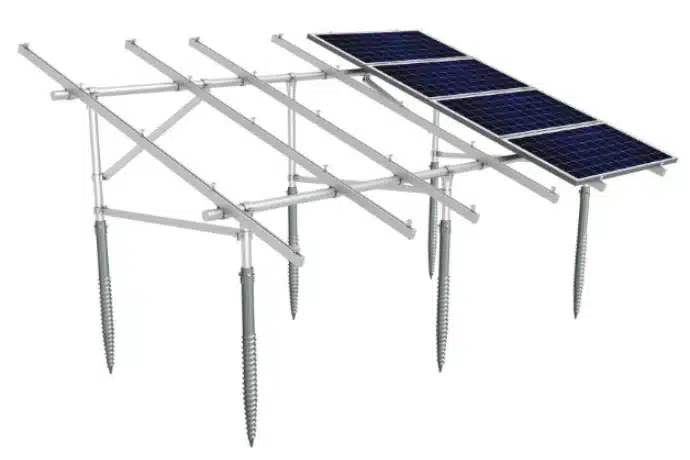
How much do ground-mounted solar panels cost?
Typically, Ground mounts for solar panels will cost a little more, but it really is a case-by-case evaluation process.
Moving large panels onto a roof, drilling holes in the roof and weather-proofing those perforations can sometimes be more daunting than putting a pole in the ground and mounting some panels on it.
Wood Mackenzie energy analysts estimate the cost of 8 kilowatts of rooftop solar at $2.99 per watt (or $23,920 total).
How many ground-mounted solar panels do I need?
The average home will need about 19 ground mounted solar panels for home.
Here is a simple calculation used to arrive at that number:
Assume 400 watts of solar panels are used and the location has 4 hours of peak sunlight per day. Each solar panel will generate 1.6 kWh (1,600 Watt-hours) of electricity per day.
Average household energy use is about 900 kilowatt hours (kWh) per month or 30 kWh per day.
To build a solar system that covers the average energy usage, you would need at least (30 kWh / 1.6 kWh =) 19 solar panels.
Of course, your home’s electricity consumption and the amount of sunlight may differ from the average. Analyze the situation on a case-by-case basis.
How are the solar panels installed on the ground?
Before installing ground mounted solar panels, you must evaluate factors such as sunlight, soil composition and potential shading. Additionally, obtaining the necessary permits and adhering to local regulations is critical to ensuring compliance and project success. After that, you can begin the installation.
Clearing and Grading the Site
Installation begins with clearing the designated area of vegetation and debris. Proper grading ensures a level surface, which is essential for a stable, efficient solar panel installation.
Mounting and anchoring system
Solar panels are mounted on firmly anchored solar panel ground mount racks or frames. Depending on the type of system, a concrete foundation or driven piles may be used to provide stability and durability.
Wiring and Electrical Connections
Once installed, wires connect the solar panels to the inverter and the grid. Properly installed wiring and connections are essential for safe and efficient energy transfer.
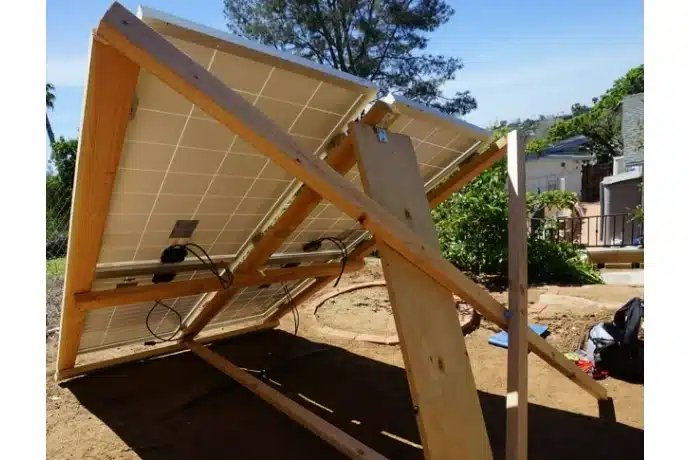
What are the best solar panel manufacturers?
Here are a few solar panel manufacturers that are doing an excellent job:
- Sungold Solar : Known for its high quality, efficient and durable solar panels, Sungold Solar offers a wide range of solar solutions including flexible portable panels.
- Jinko Solar : JinkoSolar is one of the largest and most reputable solar panel manufacturers in the world, known for its high-efficiency monocrystalline and polycrystalline panels.
- Trina Solar: As a leading solar solutions provider, Trina Solar offers innovative bifacial and smart solar panels known for high performance and reliability.
- LONGi Solar: LONGi Solar LONGi Solar specializes in monocrystalline silicon solar panels and is a global leader in high-efficiency solar technology, offering the popular Hi-MO series.
Final Thoughts
Ground mounted solar panel systems offer many advantages over standard rooftop panels. The extra energy they can generate makes them worthwhile.
Do some research on your own and talk to a local solar installer to find out how ground mounted solar panels can best help you meet your home’s energy needs.
Frequently Asked Questions
Can I DIY solar panel ground mount myself?
Yes, it is possible. It depends on your individual capabilities. Check with your local authorities to find out solar panels ground mount diy what solar policies you need to follow.
Are ground mounted solar panels cheaper?
These solar panels are usually the same as those used on roofs or other installations. However, the cost of installing ground mount solar panels can be higher because you will need to build a new mounting structure and run more wires.
Can I get incentives for ground mounted solar panels?
Yes, federal tax credits and many other incentives do apply to ground mounted solar systems.





